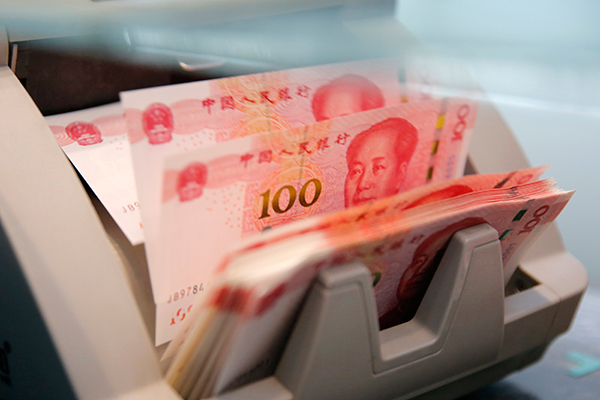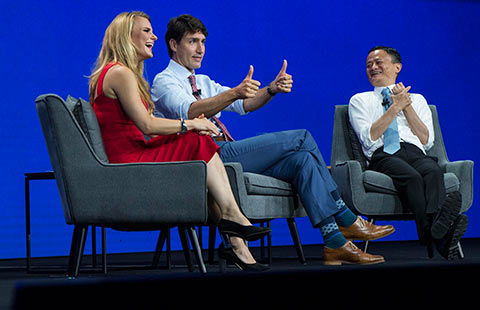Monetary policy to stay tight: Economist
 |
|
Chinese 100 yuan banknotes are seen in a counting machine while a clerk counts them at a bank in Beijing, March 30, 2016. [Photo/Agencies] |
Cutting debt ratio will remain one of policymakers' priorities to control financial risks
Chinese monetary policy may remain relatively tight in the near future, as cutting the debt ratio will remain one of policymakers' priorities aimed at controlling financial risks, a leading economist said on Wednesday.
Without controlling the original source of credit, or the monetary base, any financial deleveraging effort will be discounted, said Li Yang, director of the National Institution for Finance and Development (NIFD) under the Chinese Academy of Social Sciences.
The think tank released a report on Wednesday showing that the leverage ratio of the real economy, or the debt to GDP ratio in non-financial sectors, climbed slightly to 238.2 percent by the end of the second quarter, up from 237.5 percent three months earlier.
The ratio for the financial sector, however, dropped to 74.2 percent by June, 3.1 percentage points lower than in the first quarter, due to the tightened regulations after the top-level financial work conference in July.
Despite a still-high headline leverage ratio, the weight of debt is shifting between different sectors, which indicates the improvement of the credit structure and an easing of financial risks, said the report.
Zhang Xiaolei, a professor at the NIFD, highlighted that the expansion of fiscal deficit may add pressure on the government to borrow more money in the second half of the year by issuing bonds, and its debt ratio is expected to rise.
According to data from the Ministry of Finance, during the first six months, the year-on-year growth of fiscal income was 9.82 percent, much slower than the 15.8 percent increase in fiscal expenditure. A financial deficit emerged in the first quarter of 2017, the earliest in each year since 1996.
The report expects that the treasury bond issuance will hit a record high this year and it will lift the government's total debt ratio.
For local governments, the debt to GDP ratio remained stable at 22 percent in the second quarter, unchanged from three months earlier. The total lending from the local-government financing platform was 6.5 trillion yuan ($990 billion), according to the NIFD.
Together with the 16.4 trillion yuan investment in public-private partnership projects, local governments' major financing vehicles account for nearly 40 percent of the nation's GDP, the report said.
Zhang Longmei, China resident representative of the International Monetary Fund, said that "the core problem (of China's growth model) remains an excessive reliance on debt".
In addition, more attention should also be paid to housing debt, mainly stimulated by mortgage loans, as it is now higher than the average level of emerging economies, said Zhang.
"But we are confident that China can well handle this debt issue as the government has started to take effective measures," she added.

























